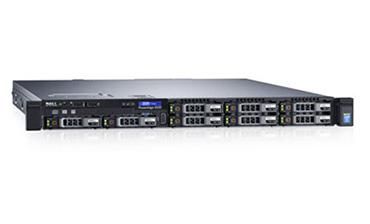Dell Updates 13th Gen Servers With Broadwell CPU, Improved Software-Defined Storage

|
|---|
Dell Thursday updated its 13th generation family of PowerEdge servers with support for Intel's latest Broadwell processor along with several new management and software-defined storage capabilities the company said will help reduce the total cost of server ownership.
Dell's updated 13th generation servers feature at their heart the new Xeon E5-2600 v4 processors, which were formally introduced Thursday by Intel at the Intel Solutions Summit, held this week in Orlando, Fla.
The new Xeon E5-2600 v4 processors give Dell's 13th generation servers a boost in performance of between 20 percent and 30 percent due to their combination of high processor frequency and high core count, said Brian Payne, executive director of platform marketing for Dell's PowerEdge server business.
[Related: Michael Dell To Keynote EMC World]
In fact, the combination of high frequency and high core count forced Dell to look at how to keep one model, the PowerEdge R730, cool enough to use in the data center, Payne told CRN.
"The new processors raise the power profile of the CPU, leading to new pressures to cool the CPUs in the chassis," he said. "When we looked at this, we saw we might need to add liquid cooling. But that would add a layer of cost and complexity. Instead, we figured out how to develop a new heat sink that allowed air cooling."
In addition to the increased performance from the Intel Broadwell processors, Dell added several management capabilities to help channel partners and their customers quickly migrate aging data center infrastructures to the new servers, Payne said.
This includes new software tools to help show the total cost of ownership and the efficiency of the new servers compared with previously installed servers to help customers with their decision-making, he said.
Also new is a productivity tool that allows simple copy and pasting of server images from one server to multiple servers to ease the deployment of the new servers and better manage their life cycles.
Dell, Round Rock, Texas, also introduced its first HTML5-based virtual console viewer, Payne said. "Most servers today use Java-based management consoles, which are hard to keep updated and which drag performance," he said. "With HTML5, customers will get quicker and more secure access to PowerEdge Servers. And we made this capability backward-compatible with the previous generation of servers."
That HTML5-based virtual console viewer is a significant upgrade to Dell's server line, said Gino Guidi, solutions architect at Sidepath, an Irvine, Calif.-based solution provider and Dell channel partner.
"Thank God," Sidepath's Guidi told CRN. "One thing we run into with customers all the time is Java. Java is one of the really painful technologies nobody wants to use but are forced to use it. With HTML5, there's no need to deploy Java or work with Java extensions."
Dell's storage management tools are also making the shift to HTML5, Guidi said. "It's a much more modern implementation than Java," he said.
Dell is also making its high-density 13th generation PowerEdge R730XD server more software-defined storage-friendly, Payne said.
The PowerEdge R730XD, which is Dell's highest-capacity server, is the first industry-standard server to include hot-pluggable NVMe SSDs, he said. The R730XD also has Dell's new Virtual Flex Zoning backplane, which allows flexible deployment of any mix of hard drive and SSD, as well as a new software-defined storage-optimized host bus adapter, the HBA 330. The HBA 330 reduces costs by removing the RAID capabilities not needed when software-defined storage is deployed, he said.
The addition of Virtual Flex Zoning and the HBA 330 will be a boon for software-defined storage deployments, including those based on VMware's VSAN technology, Guidi said.
"Software-defined storage looks at storage as a bunch of disks, and not as RAID volumes," he said. "The new technology will make deployment of VSAN simpler. Customers today are all talking about VSAN. They may not be deploying it now, but everyone is interested. We have customers buying servers with VSAN in mind. They may not deploy it today, but keep it in mind for the future."